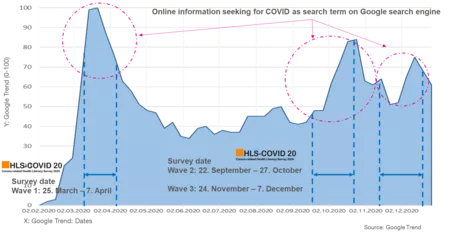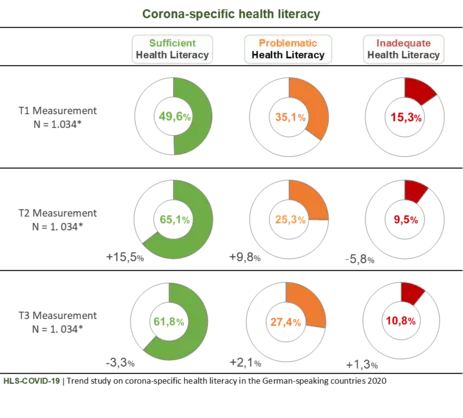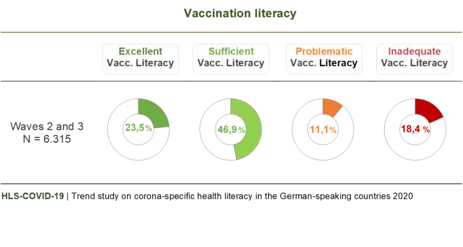

The HLS-Covid-19 study is an online representative and international trend study measuring corona-specific health literacy conducted at five measurement points in 2020 and 2021 (additional waves are planned for 2022). This is the first longitudinal study in health literacy research. In the first three waves, the survey was conducted in Germany, Austria and Switzerland. The survey assessed corona-specific health literacy, information and prevention behavior, vaccination attitudes, beliefs and acceptance, knowledge about COVID-19 as well as worries, future anxiety and perspectives, and risk assessment.
HLS-Covid-19 is funded by the German Federal Ministry of Health (BMG) and the German Federal Ministry of Education and Research (BMBF). Project coordination is located at the Chair of Health Literacy at TUM, which cooperates with the Interdisciplinary Center for Health Literacy Research (IZGK) at Bielefeld University, the Hertie School Berlin, Public Health Austria and the Careum Foundation Switzerland. The study team includes Prof. Dr. Orkan Okan, Torsten Michael Bollweg (IZGK), Prof. Dr. Doris Schaeffer (IZGK), Prof. Dr. Ullrich Bauer (IZGK), Prof. Dr. Klaus Hurrelmann (Hertie School), Dr. Saskia De Gani (Careum) and Dr. Robert Griebler (GOEG).
In all three countries, the sample was drawn as a random selection stratified by quota from the members of an online panel. The country panels include 160,000 active panelists in Germany, 14,000 in Austria, and 20,000 in Switzerland.
Samples and survey periods of the five HLS-Covid-19 waves:
| Wave | Country | Survey period | Sample | Age |
|---|---|---|---|---|
| Wave 1 | Germany | 31.03.-07.04.2020 | N=1037 | 16+ years |
| Austria | 20.03.-27.03.2020 | N=1300 | 18+ years | |
| Switzerland | 05/2020 | N=1500 | 18+ years | |
| Wave 2 | Germany | 22.09.-05.10.2020 | N=1021 | 16+ years |
| Austria | 22.09.-13.10.2020 | N=1185 | 18+ years | |
| Switzerland | 22.09.-07.10.2020 | N=1021 | 18+ years | |
| Wave 3 | Germany | 24.11.-04.12.2020 | N=1036 | 16+ years |
| Austria | 24.11.-07.12.2020 | N=1020 | 18+ years | |
| Switzerland | 24.11.-09.12.2020 | N=1018 | 18+ years | |
| Wave 4 | Germany | 21.06.-25.06.2021 | N=1034 | 16+ years |
| Wave 5 | Germany | 06.12.-13.12.2021 | N=1033 | 16+ years |
Table 1: Survey periods and samples
So far, the results for waves 1 and 2 have been published for Germany, Austria and Switzerland (see below). Waves 3 to 5 are currently being processed and will be published in 2022 in both German and English. Figure 1 shows the information-seeking behavior on coronavirus and Covid-19 of the German population for the year 2020, showing that the peaks of searches were in March/April, October/November, and December, correlating with the survey periods of the first three waves in Germany. It becomes obvious that people in Germany have increasingly searched for information about coronavirus and Covid-19 on the Internet, which is why skills in managing health information - i.e. health literacy - are highly relevant in context of the pandemic.
The German version of the HLS-EU-Q47 questionnaire and its short form HLS-EU-Q16 were used to develop the HLS-Covid-19 study questionnaire. Based on this, the study team developed and validated the HLS-Covid-Q22. In particular, the scales on finding, understanding, appraising and applying health information were adapted, focusing tasks related to coronavirus and Covid-19, or information concerning these topics.

Key findings in a nutshell
Between the first two measurements, the proportion of individuals with low corona-specific health literacy decreased from 50.4% to 34.8%, but again increased to 38.2% in the third wave, while the data shows that low corona-specific health literacy is following a social gradient with lower education and income being predictors of lower health literacy (Fig. 2). The most difficult challenges were critically appraising media information about Covid-19 and applying information to inform own behaviour. Initial analyses of waves 4 and 5 for Germany confirm these trends overall.
Compared to the results on generic health literacy in Germany, the results of the HLS-Covid-19 study provide a more positive picture regarding the state of population health literacy, although the proportion of people having difficulties managing health information about coronavirus and Covid-19 is still very high (see above). Presumably the high levels can be linked to the fact that prevention messages such as the behavioural recommendations (e.g. physical distancing, hand washing, wearing a mask), are easy to understand and apply, especially compared to otherwise available health information on diseases, self-management and medication, which are usually much more complex. At the same time, information about Covid-19 has been provided continuously and extensively on many information channels since the beginning of the pandemic. Such a broad and sustained health communication campaign providing information on a specific health risk has never been seen before in Germany. The findings suggest that the continuous provision of health information may have a positive effect on people`s health literacy.
Individuals with low corona-specific health literacy:
- feel significantly less informed about the COVID-19 pandemic and the coronavirus.
- have less trust in all sources of health information.
- are significantly more likely to be confused by the amount of information available about the coronavirus.
- are less likely to inform themselves more about health topics since the outbreak of the pandemic (46.6% with high health literacy vs. 41.0% with low health literacy).
- are significantly less likely to engage in physical distancing, handwashing and wearing a face mask.
- more often have doubt in the effectiveness of recommended health behaviours (e.g. physical distancing, mask wearing) in preventing an infection with the coronavirus.
- have more often negative attitudes toward vaccination and show less vaccination read-iness.
- are less concerned that they or a family member might get infected with the corona-virus.
- are more likely to think that the threat posed by the coronavirus is being exaggerated.
- are more likely to think that – regarding the COVID-19 pandemic and associ-ated consequences – the worst is already over.
Information behaviour
- Overall, people feel well informed about the coronavirus, however, the proportion of very poorly informed people has increased significantly compared to the first survey in Spring 2020, while the proportion of well-informed people has decreased.
- About half of the respondents stated that they felt confused by the large amount of information on the coronavirus: 42.5% felt "somewhat confused", 8.9% felt "very confused".
- Almost half of the participants (45.2%) reported that they engage with health in-formation more frequently since the start of the COVID-19 pandemic. However, 13% stated that they would engage less than before.
- Television is highlighted as the most frequently used source of information about the coronavirus.
- However, people have most trust in doctors, health experts, and health profes-sionals, local health authorities, and official health information websites (e.g. Ministry of Health, Robert Koch Institute, Federal Centre for Health Education).
Prevention behaviour
- Individual behavioural measures such as wearing a protective mask (90%), washing hands more frequently (83%), and keeping a distance (82%) are generally applied, but often not in combination – as would be required by nationwide recommendations within the public health COVID-19 strategy.
- More than a quarter of respondents do not implement all of the three aforemen-tioned preventive behaviours.
- Women (78.4% vs. 67.4% of men) are more likely to engage in all three preven-tive behaviours.
- Only 59% of 16- to 29-year-olds wear a mask, wash their hands more frequently, and practice physical distancing.
Vaccination-related attitudes and corona-related knowledge
- 54% of participants stated they were willing to get vaccinated once a vaccine against the coronavirus is available. Another 22.3% stated they would "maybe" get vaccinated, and about one quarter of the population did not want to be vaccinated at the time of the survey.
- The percentage of those who are critical of vaccinations is not negligible: 10.7% think that vaccinations are unsafe and 7.8% do not believe vaccinations are ef-fective. Another 8.2% do not think vaccinations are important to protect them-selves and their own children, and for 12.5%, vaccinations are not compatible with their attitudes and religious beliefs.
- Individuals with a lower education level and the elderly are more likely to have negative attitudes toward vaccinations. However, the vast majority of the popu-lation believes that vaccinations are safe (89.3%) and effective (92.2%) in pro-tecting themselves and their own children (91.8%).
- Younger people are significantly more likely to say that vaccinations are harming the immune system. They are also more likely to think that there is already a vaccine for coronavirus and a medical treatment for COVID-19 – although by the time of the survey no vaccine was available.
- People with a low level of education are also more likely to fear that vaccines would have severe side effects and be harmful to the immune system.
In the context of vaccination, it is evident that although vaccination literacy of the German, Austrian and Swiss populations appears to be sufficiently developed, however it is still alarming that almost one-third of adults nevertheless seem to have low vaccination literacy (see Fig. 3).
Worries, concerns, risk assessment and future prospects
- 90% of respondents are concerned about COVID-19 and the associated crisis, 71.5% are afraid of getting infected, 66.1% take the threats associated to COVID-19 very seriously, and 93.7% believe that not much will change in the foreseeable future or that things could get worse.
- People with a chronic disease were more likely to voice fear and concern.
Denial of the coronavirus
- Almost one in ten respondents (8.1%) agree with the statement that "the corona-virus does not exist at all"
- People with a low level of education, from the “new” federal states (former states of Eastern Germany), younger people, and parents of minors belong to the group of those who significantly more often deny the existence of the coronavirus.
Selected publications
Peer-reviewed
Gesundheitskompetenz der Bevölkerung im Umgang mit der Coronavirus-Pandemie
Report
Gesundheitskompetenz der Bevölkerung im Umgang mit der Coronavirus-Pandemie
Documentation
KonsortSWD Datenbank zur Forschung zur Corona-Pandemie: HLS-COVID-19: Corona-bezogene Gesundheitskompetenz in der Bevölkerung
Press and media
Gutes Corona-Wissen in der Bevölkerung
Gesundheitskompetenz der Bevölkerung im Umgang mit der Coronavirus-Pandemie
Ergebnisse der zweiten Erhebung der HLS-COVID-19 Studie
Viele junge Menschen tun sich schwer mit Einhaltung von Schutzregeln


